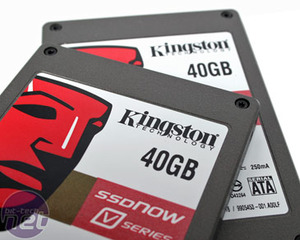Results Analysis
There’s plenty to talk about when it comes to performance, especially as we’ve also tested the drive in a RAID 0 (striped) array. In the simpler single drive configuration though the 40GB V Series seriously struggles, and that’s immediately obvious from theoretical speeds in HD-Tach.An average write speed of just 46MB/s across the drive, in comparison to the 160MB/s+ of Indilinx and Samsung based drives is pretty dire, and isn’t even half as fast as the Samsung Spinpoint F3 hard disk drive. An average read of 180MB/s isn’t too fantastic in comparison to other SSDs out there either, and adding a second drive in RAID, while beneficial, still doesn’t put the V Series convincingly ahead of the competition in anything bar burst speed.
Moving to real world sequential file testing in FC-Test and the drive’s dire write speeds become all too apparent. Taking 22 seconds (cut to 10 seconds in RAID 0) to write 1GB of MP3s and 38.5 seconds (20.6 seconds in RAID 0) to write 1.6GB of larger ISO files is pretty pitiful for performance storage, and you’ll feel these limitations when you’re installing patches or updates or copying large files.
Comparable read speeds aren’t as bad though, with a single drive not too far off the read speed of a 128GB Vertex when dealing with 1GB of MP3s, and two seconds down on the same drive when reading 1.6GB of larger ISO Files. Read speeds in RAID were, as to be expected, spectacular, and with 255MB/s of read on tap the twin 40GB V Series read our MP3 and ISO file patterns in just 2.4 and 4.9 seconds respectively.
Looking to random read and random write performance it soon becomes clear that this drive is built using an Intel drive controller – the random write speed is a huge 33MB/s, three times that of an Indilinx or Samsung based controller. Random read was also very good at 25MB/s and under a combined random read/write load the drive again came up trumps with a speed of 17.4MB/s. However, there’s a caveat here as while we noted the superb write speeds, maximum write latencies were worryingly high at close to 400ms. This is an issue the drive shares with the new line of Intel X25-M 34nm drives, and it’s down to Intel to fix. However, as the average random write latency is so low at less than 1ms, there’s nothing to worry about in regards to the infamous “drive stutter.”
RAID 0 random read and write speeds were, as to be expected, fantastic, with random read performance improving more than one hundred per cent (likely due to the different way the drives act under RAID). Random write speeds of 58MB/s and random read speeds of 62.7MB/s are representative of performance we’d usually associate with a data centre, and average response times drop accordingly too.
However, all that random read speed doesn’t do much for the drive in real world circumstances and the V series remains slower than Indilinx and Samsung based drives in when both booting Windows and loading Crysis, although single drive times of 28 seconds and 31 seconds respectively are still big improvements over a hard disk drive. As we’ve seen before with RAID 0 though, all those theoretical and sequential speed improvements fail to apply to real world circumstances and the V Series 40GB in RAID 0 actually proved slower than a single drive when booting windows (due to RAID controller boot time overhead) and loading Crysis was just one second faster.

MSI MPG Velox 100R Chassis Review
October 14 2021 | 15:04











Want to comment? Please log in.